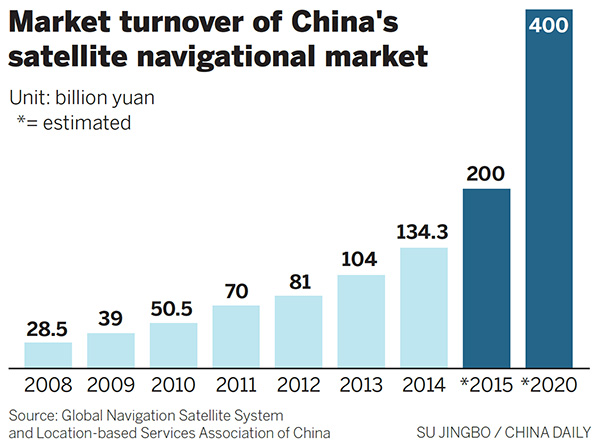Beidou satellite generates US$31.5b for online clients
 0 Comment(s)
0 Comment(s) Print
Print E-mail China Daily, November 16, 2015
E-mail China Daily, November 16, 2015

In fact, there is hardly an online sector that has not been affected by the eye in the sky network.
Apart from taxi-hailing mobile apps, an array of booking services have sprouted up on smartphones ranging from restaurant reservations to film tickets.
All need real-time location information, which is supplied by Beidou, or other satellite services.
Even so, the biggest potential customers online could be companies such as Didi Kuaidi, a local car-hailing platform, and rival Uber Technologies Inc in the US.
Didi Kuaidi is linked to the GPS mapping and location services operated by its backer Tencent Holdings Ltd, which is one of the big three online players in China. Uber uses its investor Baidu Inc's technology.
While the government is asking all smartphones manufacturers to install GPS systems that are compatible with Beidou, many still lack that function. But, again, that is changing.
"Our devices are using Beidou because the company embraces good-quality services that can lift customer experience," Lei Jun, CEO at Xiaomi Corp, one of the largest electronics companies in the country, said.
About 10 million Xiaomi smartphones, equipped with Beidou chips, are sold each quarter in China, proving the commercial eye in the sky has excellent vision.
Chip company to cash in on country's GPS-like navigational system
Peter Zhou and his firm Xi'an HuaXun Microelectronics Inc were going through a tough time in the summer of 2009.
The chip company in Xi'an, Shaanxi province, was struggling after he returned from the United States with a doctorate degree.
"We had no idea how we could make a profit competing against overseas companies that dominated the market," Zhou, founder and chairman of the firm, said. "It was the most difficult time in my working life, and I feared the company would not survive the winter."
The problem was HuaXun designed chips used in navigational devices that were only compatible with the US Global Positioning System or GPS.
Since 80 percent of the chips sold in China were made overseas, the company was on the verge of going under in the face of fierce competition.
With a last throw of the dice, Zhou decided to switch the firm's focus into building chips that operated the Beidou GPS system.
"It was the last chance to revive the company and a very risky one," he said.
But his bold move paid off as the Beidou network expanded in the opening eight months of 2010 to include six satellites.
Slowly his business started to take off as there were only a few Chinese chip companies conducting research and development into using the satellite system for commercial use.
Then in 2012, HuaXun rolled out its first integrated chip set to support the Beidou network.
"Orders from across the country started to pile up on my desk," Zhou recalled from his small office in the southern suburbs of Xi'an.
Fast forward three years and business is booming. Customers include logistics firms that need to monitor the locations of their trucks and goods, the police force and research institutes. In the first half of this year, HuaXun sold more than 900,000 chip set units, although the privately owned company has yet to reveal detailed financial figures.
It now employs 100 workers at its factory in Xian after receiving an injection of funding from a subsidiary of State-owned China Aerospace Science and Industry Corp in 2013 without disclosing the details.
As the aerospace and satellite navigation industry continues to expand in China, Zhou is confident demand for the company's chip sets will grow.
"Moving to the Beidou sector changed the destiny of HuaXun," he said. "It turned out to be a very wise decision."






Go to Forum >>0 Comment(s)